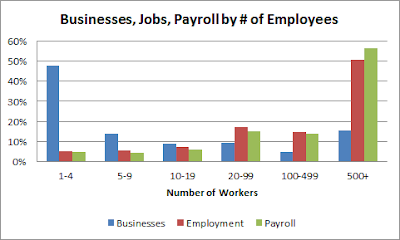Their presentation was themed, "Why we're so screwed." They basically covered the problems with the US economy, the causes of US debt, and other things related to the two. It was all very interesting, but one thing in particular jumped out at me: the benefits of preschool.
One of the points they made was the difficulty of job re-training. A study conducted by economists at the University of Chicago showed that there were no discernible benefits for unemployed adults that underwent job training; in some cases the participants actually did more poorly than members of the control group that didn't undergo the training. They (Planet Money folks) compared this finding with another study that looked into the benefits of preschool. In that study, children that went to preschool scored higher in every metric when compared to children that didn't attend preschool. So the children that attended preschool had a decreased likelihood of being arrested, had more income, better health, obtained higher levels of education, etc.
The reason that preschool education seems to yield such positive outcomes has to do with 'soft skills.' Things like conflict resolution, using words to communicate effectively, and being friendly with others are all examples of soft skills. People without these skills have a harder time as they grow up; and unfortunately, these skills are difficult to learn as an adult.
The researchers that conducted the preschool study estimated that for every dollar spent on granting a child the opportunity to attend some sort of preschool program, that society experiences something on the order of a 800:1 benefit. That is to say, for every dollar we invest in sending a child to preschool, we would see 800 dollars paid back in various ways. Fewer people would wind up in prison, saving costs, and more people would achieve higher levels of education leading to higher incomes for more people. There are other costs that are saved, but those are probably the most notable.
There are criticisms of this study and its implications. Not every preschool is going to be equal, and the benefits gained would therefore not be as dramatic as this study may suggest. But even if the study is exaggerating the financial benefit several times over, it's clear that some benefit would be had by having every child attend some sort of preschool program; maybe not 800:1, but a 500:1 or 200:1 is still an insane payback ratio.
This is one of the things that I think is often overlooked in discussions regarding 'human investment.' By that I mean programs that are designed to essentially invest in people, so that may include a preschool program, or assistance in education, or some sort of drug rehabilitation program. These programs most tangibly benefit the people that employ them, but they also benefit our society as a whole. If a drug addict is able to kick the habit thanks to some sort of drug rehab program, all the costs associated with policing that person, the costs associated with the drug trafficking employed to supply that person with the drugs, and all the other various costs paid by society, are done away with.
That concept seems to often times be absent from discussions surrounding these types of programs. While there is a price to be paid for helping people, there is also a cost for not helping those people. If someone I don't know is able to get an education thanks to a government program or government assistance, I am, and society in general is better off because of it. That person is far less likely to be engaged in illegal activity and is more likely to be an asset to their community and society.





